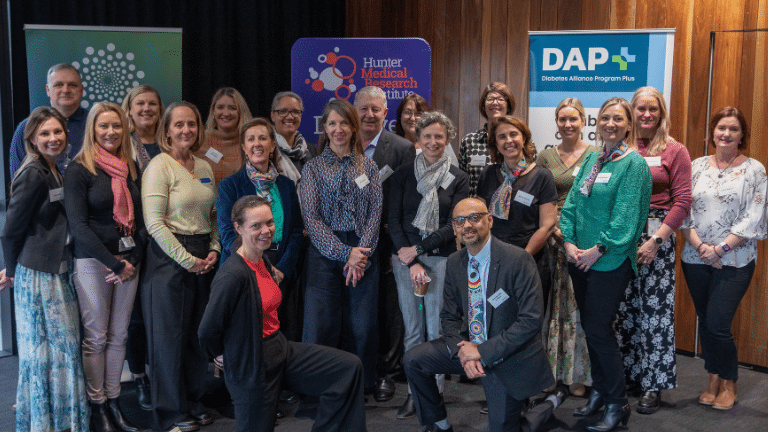
Dr Masha Somi, Assistant Secretary of the Primary Care Reform Branch at the Commonwealth Department of Health and Aged Care, attended the Hunter Medical Research Institute (HMRI) today to hear from local experts leading four different integrated health care programs – programs that combine primary care, community, medical research and hospital services to provide better access to health care closer to home.
NSW Regional Health Partners, together with the Hunter Medical Research Institute (HMRI), Hunter New England Primary Health Network (the PHN) and The Hunter New England Local Health District (HNELHD), hosted the event to showcase these exemplary models of care to Dr Somi and her team.
Integrated care programs provide multiple benefits. Patients experience improved clinical outcomes and reduced waiting times for specialist care. General practitioners (GPs) and practice nurses receive targeted education and training, enabling them to better support their patients. Additionally, patients don’t have to travel to see a specialist, resulting in a cost savings.
One of the programs presented, the Diabetes Alliance Program Plus (DAP+) developed in Newcastle, fosters collaboration between primary and specialist care to improve diabetes management for those living in regional and rural areas. Diabetes specialists from Newcastle work with local GPs and GP practice nurses to ensure patients receive best-practice care regardless of where they live.
An Aged Care Nurse Practitioner Pilot, currently being implemented in six residential aged care facilities (RACFs) in the Hunter, is improving the timeliness of clinical care for residents. Nurse practitioners, who maintain ongoing relationships with residents, work with the residents’ GP, alerting them when any changes in clinical management are required. This initiative addresses the difficulties RACFs can have in getting residents to their GP, or for GPs to be able to leave their practice to see RACF residents.
Another exemplar integrated care program provides essential health care for victims of domestic and family violence (DFV) and their children, filling a critical gap on the Central Coast. The nurse-led outreach program ensures women, and their children receive timely, best practice, trauma-informed care, wherever they are staying, and early access to appropriate interventions and support to amend the profound effects of DFV.
The highly successful Health Pathways Program, a collaboration between the PHN and HNELHD, provides GPs and other primary care clinicians access to an online portal with localised information to help them assess and manage medical conditions, and refer locally. This means patients can access a local expert to receive care where this is available.
Associate Professor Associate Professor Nicolette Hodyl, Director at NSW Regional Health Partners, stresses the importance of integrated care to support good health in rural and regional communities. “Primary care is generally the first or only point of contact with the health system for those living in regional and rural communities and provides a pathway for community and hospital-based clinicians to work together to ensure patients get the care they need, regardless of where they live.”
“Integrated care programs improve communication and connectivity between health care providers in primary care, community, and hospital settings, supporting patients to receive care and minimising unnecessary travel to see specialist,” John Baillie, Executive Manager of the PHN’s Primary Care Improvement team.
Professor Frances Kay-Lambkin, CEO and Institute Director at HMRI, was delighted to have hosted the group.
“We are delighted to welcome Dr. Masha Somi to HMRI and to showcase the innovative integrated care programs that are transforming healthcare delivery right here in the Hunter New England Local Health District footprint. These programs are a clear demonstration of how effective and streamlined collaboration at all levels can significantly enhance patient outcomes and access to care.
By working together, we can ensure that individuals, regardless of where they live, receive high-quality, timely, and cost-effective healthcare. HMRI is proud to be at the forefront of these efforts, driving research and initiatives that improve health and wellbeing in our communities.”
More information on DAP+ can be found at https://www.dapplus.org.au/
HMRI would like to acknowledge the Traditional Custodians of the land on which we work and live, the Awabakal and Worimi peoples, and pay our respects to Elders past and present. We recognise and respect their cultural heritage and beliefs and their continued connection to their land.

Hunter Medical Research Institute
We’re taking healthy further.
Locked Bag 1000
New Lambton
NSW, Australia, 2305



This site is protected by reCAPTCHA and the Google Privacy Policy and Terms of Service apply.
Copyright © 2024 Hunter Medical Research Institute | ABN: 27 081 436 919
Site by Marlin Communications
